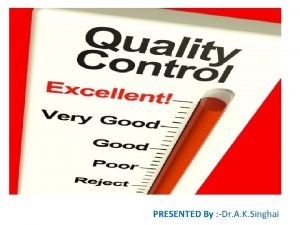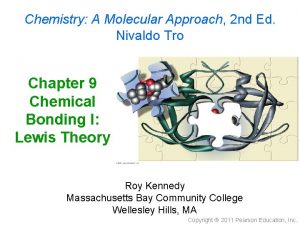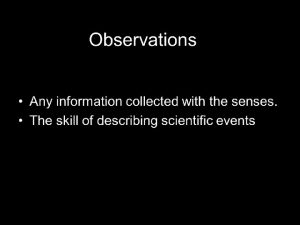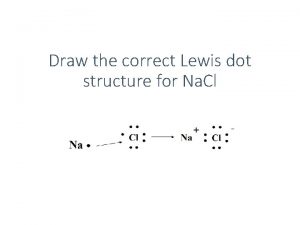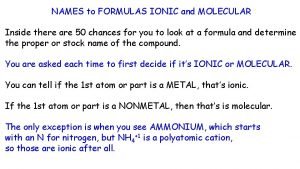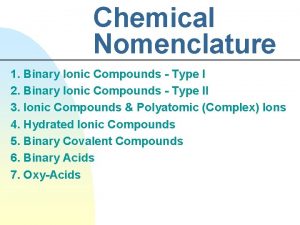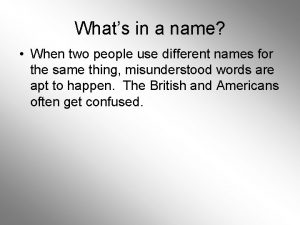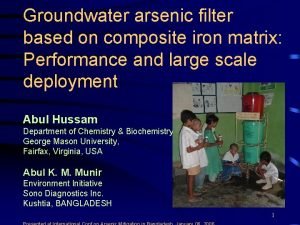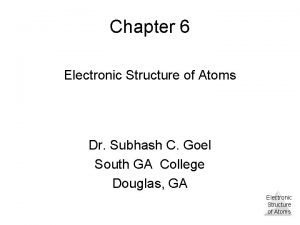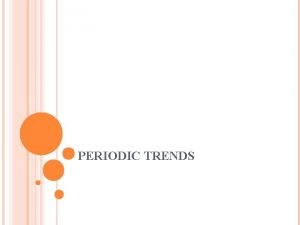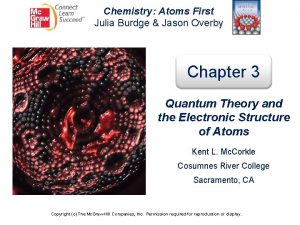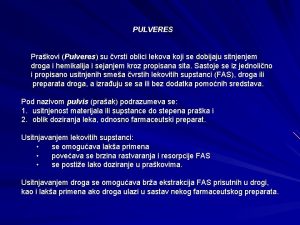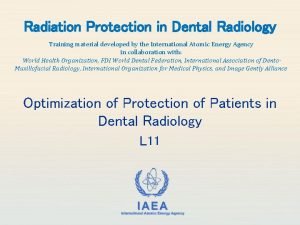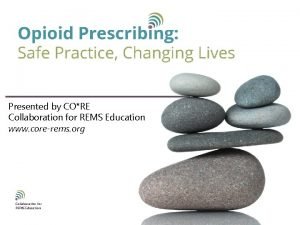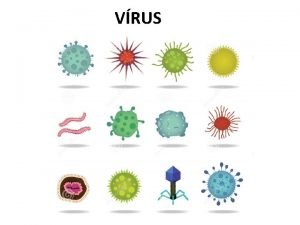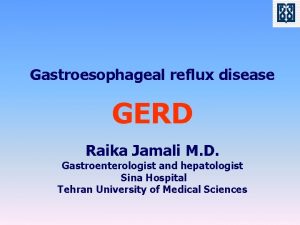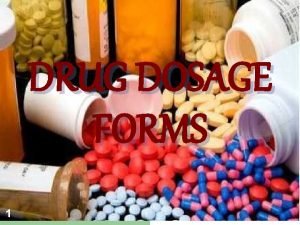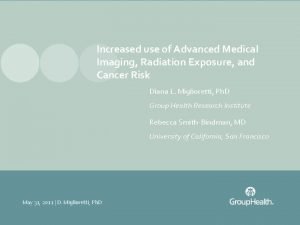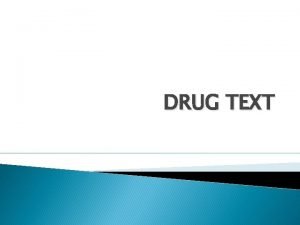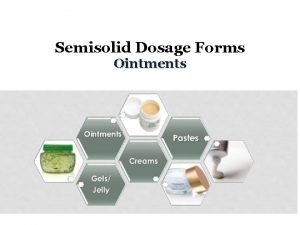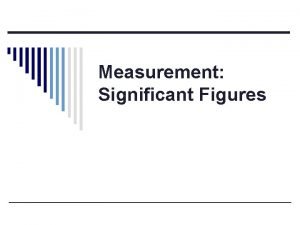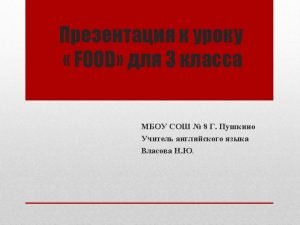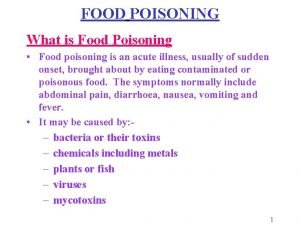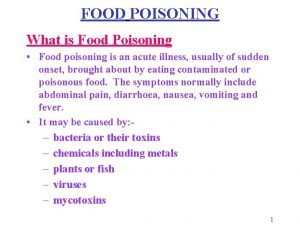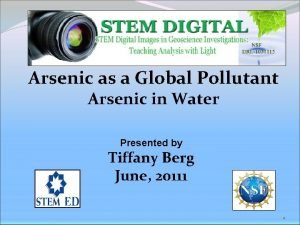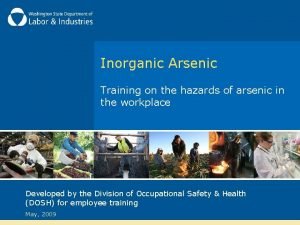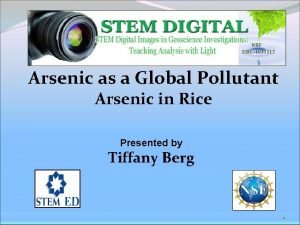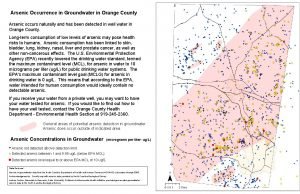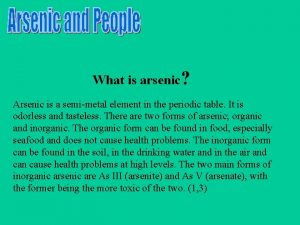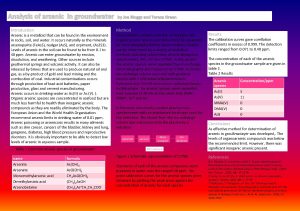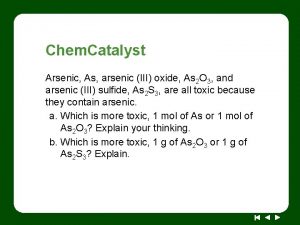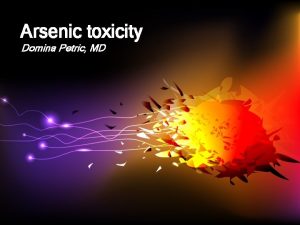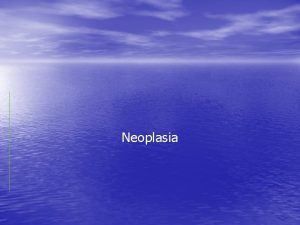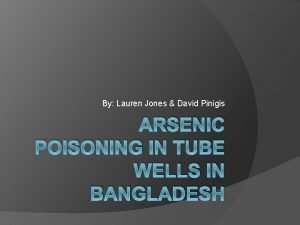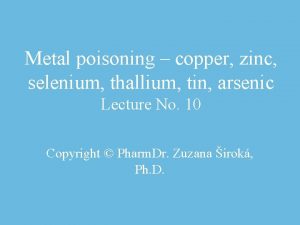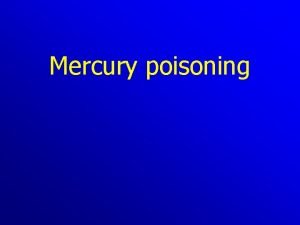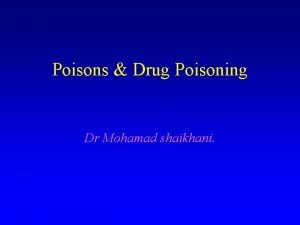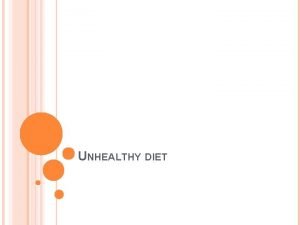Chronic Arsenic Poisoning at Low Doses Some recent
































- Slides: 32

Chronic Arsenic Poisoning at Low Doses: Some recent epidemiological findings and implications for arsenic exposure Lecture at London School of Tropical Medicine and Hygienc 12. 45 pm, Thursday December 6 th 2001 by Richard Wilson Mallinckrodt Research Professor of Physics Harvard University

Problems with NAS report (2001) Uses Taiwan ecological data as a basis Straight line to the national incidence Ignores all other data Data in tables, in graphs and in text are different “it is wise to compare the results of the assessment with the real world” (2 pages out of 188)

ARSENIC Metal Molecular weight 74. 92 Melting Point 8170 C Specific Gravity 5. 73 Many compounds and minerals

• Arsenic has been used for over 3000 years • As 2 O 3 ARSENLITE • by roasting As 2 S or Fe. As. S • As 2 S 3 ORPIMENT • Pb. HAs. O 4 SHULTENITE • KH(ASO 2)2 Fowler’s Solution • CH 3 As. O(ON 2)2 • CH 3 As. O(OH)ONa • Pesticides with various names

Common Sources Non-Ferrous Smelters Coal Burning Cotton Gins Cigarette smoke

Early Information (pre 1986) Acutely Toxic to Rodents and People Used as Medicine Fowler’s solution 1% in alcohol Cure for Syphilis (recent) cure for leukemia

Early Information (pre 1986) contd. 1888 Skin lesions and Cancers 1897 Lung cancer from pesticides 1920 s lung cancer from smelters 1950 s angiosarcoma from pesticides BUT no cancers in rodents

Early Misconception (pre 1986) Rodents dont get cancer, therefore people wont Inhalation a special case with non-linearity (but Zeise and I contested that)

Preliminary warning • TSENG et al found skin Tumors in TAIWAN • BUT • They appeared to follow a threshold relationship.

THE GREAT SURPRIZE In 1986 C J Chen And collaborators reported internal cancers in the same area of Taiwan IGNORED FOR 5 YEARS! Why? Only a Chinese study (as bad as the Russians? ) 1990 Allan Smith 1991 Byrd, Lamm Wilson took him seriously

THE GREAT SURPRIZE The internal cancers seemed to be linear with dose and the risk is huge. BUT: An ecological study and Only in one location and there might be another cause

THE VINDICATION CHILE ARGENTINE INNER MONGOLIA BANGLADESH WEST BENGAL NO PREVIOUS STUDY INCONSISTENT

LOW DOSE LINARITY the regulatory default • Crump Guess and Peto of 1975

CRITICAL ISSUES FOR LINEARITY • The POLLUTANT ACTS • in the same way as • WHATEVER ELSE INFLUENCES THE • CANCER RATE • CANCERS CAUSED BY • THE POLLUTANT • ARE INDISTINGUISHABLE FROM OTHER CANCERS



THE ARGUMENTS APPLY TO ANY CARCINOGEN e. g ARSENIC

Arsenic risk • Skin lesions may be unique • There may be a threshold at • 50 -150 ppb • (Data from Taiwan and also from Inner Mongolia) • BUT • Internal cancers may be different

Toxicologists like Thresholds • Few (if any) toxicologists address the Peto argument. • ? ? Threshold for bladder cancer and not for lung cancer? ? • ED 01 data on 2 DAA • linear for liver • threshold for bladder • anticarcarcinogen for others • WHY IS THERE SO MUCH CANCER IF EVERYTHING HAS A THRESHOLD?

Many Legislators still want < 1 in a million! Where does this leave regulation of arsenic? Limits should be 5 ppt! (not practical)




Arsenic risk • For internal cancers • At 500 ppb Measured Risk • (Chile) is 10% • If linear, • risk is one in a million • at 5 parts per trillion!! • “background” is about • 2 parts per billion

MY CONCLUSION (REPEAT OF 20 YEARS AGO) IT IS NOT POSSIBLE TO REGULATE A ONE IN A MILLION LIFETIME RISK CONSISTENTLY • ATTEMPTS TO DO SO • ARE • ARBITRARY • and • CAPRICIOUS

How should we dispose of ARSENIC? (contd) EPA says that Arsenic need not be put in a secure landfill. BUT If the proposed EPA regulations for Yucca Mountain are applied No water system in USA and not much agricultural land would be in compliance.

Can One Prove a threshold? MAYBE if one focusses on the right question: Similarity to Asbestos Benzene

Can One Prove a threshold? (2) MEREWEATHER”S QUESTION (1937) Is it ASBESTOS or is it the ASBESTOSIS that is caused by asbestos that causes the lung cancers? If the former LNT is likely If the latter LNT is less likely

Can One Prove a threshold? (3) There semes to be a threshold for SKIN LESIONS (should be studied further) Are lung cancers more or less likely if there are skin lesions? (Allan Smith may tell us)

Can One Prove a threshold? (4) Are the lung cancers really indistinguishable from background cancers? If NOT Peto’s argument does not apply Try DNA matching on lung tumor samples. Similarly for asbestos cancers, radiation leukemias etc.


 Water attack test is only used for glass containers.
Water attack test is only used for glass containers. Shorthand electron configuration for arsenic
Shorthand electron configuration for arsenic Lewis structure for arsenic
Lewis structure for arsenic Thomas taylor forensic science
Thomas taylor forensic science Na lewis dot structure
Na lewis dot structure What is chromium?
What is chromium? Binary ionic
Binary ionic Formula for arsenic pentabromide
Formula for arsenic pentabromide Verbal irony in arsenic and old lace
Verbal irony in arsenic and old lace Sono arsenic filter
Sono arsenic filter Ground state of arsenic
Ground state of arsenic Periodic table of elements atomic radius
Periodic table of elements atomic radius Ground state electron configuration of arsenic
Ground state electron configuration of arsenic Pulveres
Pulveres Adderall xr dosage by weight chart
Adderall xr dosage by weight chart Radiation doses
Radiation doses Belbuca doses
Belbuca doses Methylphenidate vs adderall mechanism of action
Methylphenidate vs adderall mechanism of action Vacina sarampo quantas doses
Vacina sarampo quantas doses An elixir do not contain
An elixir do not contain Ppi equivalent doses
Ppi equivalent doses Classification of dosage forms
Classification of dosage forms Rebecca smith-bindman
Rebecca smith-bindman Augmentin doses
Augmentin doses Semi solid dosage form definition
Semi solid dosage form definition Botox crow's feet injection sites
Botox crow's feet injection sites Low voltage hazards
Low voltage hazards Mid = low + (high - low) / 2
Mid = low + (high - low) / 2 Sociability continuum
Sociability continuum High precision vs high accuracy
High precision vs high accuracy Pears countable or uncountable
Pears countable or uncountable Some may trust in horses
Some may trust in horses What are some contact forces and some noncontact forces?
What are some contact forces and some noncontact forces?
